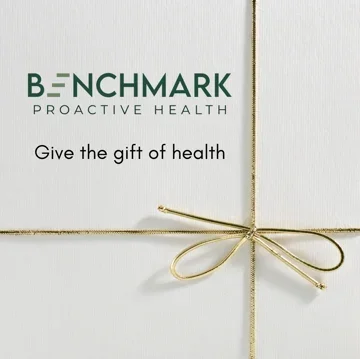#15: Better Breathing
Subscribe below to become a health insider!
In This Issue:
Quick Takes: How subtle changes in breathing can improve your recovery, sleep, mood, and more.
Community Buzz: Benefits of intense exercise before stress, sensory-centric footwear, and building habits and confidence.
Expert Q&A: An expert breathing coach breaks down "functional breathing" and shares 3 effective breathwork exercises.
Company Updates: ICYMI, request early access to the new Benchmark Dashboard. Plus, gift cards for the holidays. 😉
QUICK TAKES
Takeaways from content we’ve enjoyed & other timely topics
Breathe Better
How Breathing Shapes Resilience, Recovery, and Health
We often expect those with a high VO₂ max, indicating strong cardiorespiratory fitness, to also have a low resting heart rate (RHR) and high heart rate variability (HRV). But that’s not always the case. A high VO₂ max reflects strong aerobic capacity, but not necessarily nervous system balance. Even fit individuals can be physiologically stressed due to poor sleep, overtraining, or chronic stress, and this is often accompanied by a higher resting respiratory rate.
In fast-paced environments, we may unconsciously hold or restrict our breath while focusing on a task or working under pressure. Over time, this leads to a chronic pattern of shallow, elevated breathing that can disrupt recovery and overall health.
The good news: effective breath training can help restore balance. Let’s explore the science behind it, and then practical exercises to get started.
Breathing: A Direct Line to the Nervous System
Breathing is one of the only functions in the body that operates automatically yet can also be consciously controlled. It is a powerful bridge between body and mind, and a vital link to the nervous system.
At the heart of this connection lies the vagus nerve, the body’s main pathway for activating the parasympathetic nervous system, which governs rest, recovery, and repair. When activated, it signals the body to slow the heart rate, lower blood pressure, improve digestion, and enhance recovery.
Slow, diaphragmatic breathing activates the vagus nerve and the parasympathetic system, encouraging rest and recovery. In contrast, fast, shallow breathing (common under stress) stimulates the sympathetic system, priming the body for action.
The Power of Effective Breathing
Breathwork offers benefits that go beyond stress regulation. For example, humming during exhalation can increase nitric oxide production in the nasal passages by up to fifteen-fold. Nitric oxide acts as a vasodilator, improving circulation and blood pressure regulation.
Nasal breathing filters, warms, and humidifies air while maintaining healthy carbon dioxide levels. In contrast, mouth breathing promotes shallow, rapid breaths that keep the body in a low-grade stress state. Shifting to slow, nasal breathing enhances oxygen efficiency, nervous system balance, and sleep quality.
Those who incorporate breathwork into their routines can see measurable improvements in resting heart rate, HRV, and sleep, and experience a greater sense of calm.
➡️ Check out this month's Expert Q&A with Functional Breathing Coach Louise Brans Fitzgibbon who shares 3 exercises for you to experience the benefits of breathwork firsthand.
COMMUNITY BUZZ
Highlights from Benchmark’s community
Sweat More, Stress Less ☯️
We often think of exercise as a tool to alleviate existing stress; for example, using a workout to let off steam after a long day at work. But exercise can also be a powerful tool in preparing ourselves for stress and moderating its effects. A 2021 study had participants exercise at various intensities before a stressful situation (giving a speech, then doing mental arithmetic before a panel of evaluators), and compared their subsequent stress response. The higher intensity the exercise (higher cortisol during the workout), the lower the stress response that followed (lower cortisol levels after stress). If you’re preparing for something stressful, get a workout in first!
Sensory Soles 👣
We were intrigued by the new Nike Mind, billed as a “mind altering shoe,” that uses individual nodes on the sole to stimulate parts of the foot with every step, and activate sensory areas of the brain. It's not dissimilar from the classic Adidassage slides from Adidas, with a footbed covered in soft rubber spikes for not-so-subtle sensory feedback. After some getting used to, they become surprisingly comfortable. We've seen similar concepts from Noboso, with textured footwear and recovery tools intended to heighten proprioception. Newsletter loyalists may recall the Apollo wearable Sam shared in August, that provides subtle vibration to improve focus and relaxation. Stimulating our sense of touch can be a powerful way to activate the brain.
Self-Discipline & Self-Love 🤗
Heather recommended the book The Slight Edge by Jeff Olson, for tips on how to make healthy habits stick through small, consistent choices, a topic we always welcome. We also listened to The Diary of a CEO with body language expert Chase Hughes that touched on discipline and habit-building. Hughes asserts that discipline fuels confidence. He defines discipline as your ability to prioritize the needs of your future self over those of your present self. Before going to bed each night, he prepares for the next day, thinking “I’m going to be a butler for my future self”. Hughes says “look forward with concern, and look backward with gratitude”. He emphasizes self-forgiveness when looking back, so much so that it is “delusional”. Over time, those actions that took a lot of discipline to start will simply becomes habits.
EXPERT Q&A
Lessons and tips from health & wellness experts
Louise Brans Fitzgibbon, Functional Breathing Coach
Louise Brans Fitzgibbon
Louise is a Functional Breathing Coach and founder of BreathCoach.ca
based in Oakville, Ontario. She works with individuals and groups to help them understand how they breathe and how small changes can create shifts in energy, focus, and sleep. Louise breaks down the power of breath, and shares 3 breathwork exercises to try.
COMPANY UPDATES
The latest updates from Benchmark HQ
The Benchmark Dashboard for data, insights, and information, helping you track trends over time.
The Benchmark Dashboard 📈
We loved hearing from so many of you last month requesting access to our new dashboard! You can still get BETA access, and see your past data in this new tool.
➡️ Request here.
Benchmark gift cards. Give the gift of health.
Pssst..we have gift cards!
🎁 With the holidays around the corner, consider giving the gift of good health. You can purchase a Benchmark gift card here or get in touch and we'll help you out!



